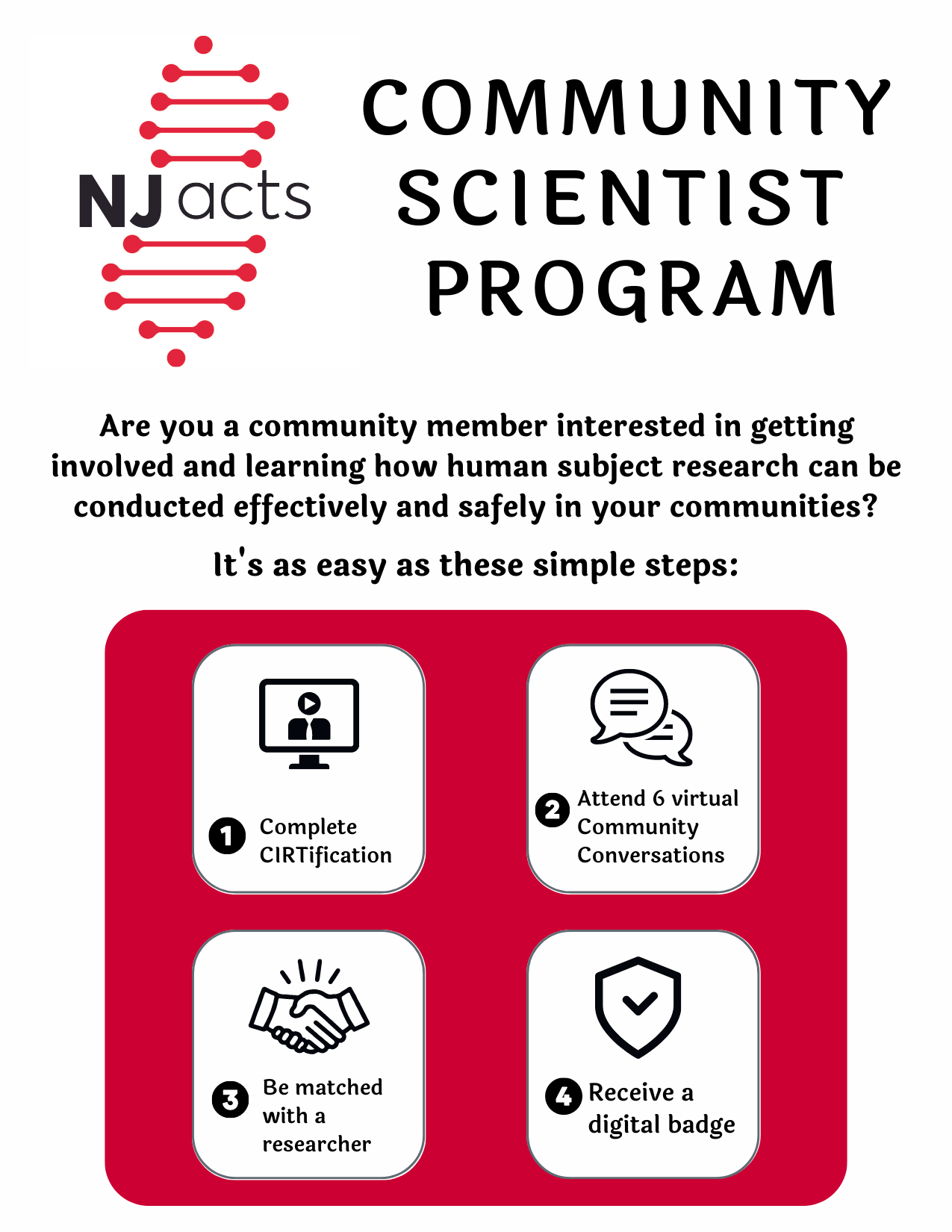180+ networks across 21 NJ counties
COMMUNITY ENGAGEMENT CORE OVERVIEW
NJACTS draws leading academic, industry and community groups together to understand and address the health needs of New Jersey. Central to this is engagement with our community to ensure that our efforts respond to their priorities. Our goal is to conduct research with the New Jersey community, in the community and for the community, and yet, have impact beyond our state’s boundaries.
Stay in Touch!
Join RCommunity!
Join Rutgers Health Service Corps!
Empowering Community-Based Research
Through Cultural and Linguistic Collaboration
- Navigating interpreter-mediated encounters
- Effective translation for research
- Understanding cultural nuances in literacy, trust, and belonging
Through collaboration across disciplines and leveraging expertise within and beyond Rutgers, CrEER ensures that research is inclusive, culturally relevant, and impactful both locally and globally.
👉 Discover how CrEER is shaping the future of community-based research here.
Association for Clinical and Translational Science (ATCS) Membership for Community Members
Did you know that community members are eligible to become members of ACTS through their affiliation with NJ ACTS?
Community members are able to access ACTS’ member benefits, including:
- Discounted registration to the annual Translational Science meeting
- Opportunities to participate in Special Interest Groups and Committees
- Access to the community platform website and more!
Resource for Investigators – CTSA Compendium of D&I Catalogs
Dissemination and implementation (D&I) research focuses on translating evidence-based interventions into real-world settings to improve health outcomes in the broader community.
An open-source CTSA Compendium of D&I Catalogs has been developed by the Clinical & Translational Science Awards (CTSA) Program’s “Advancing Dissemination and Implementation Sciences in CTSAs” working group to support investigators at any stage of their D&I skill-building journey. It provides a curated list of resource catalogs relevant to the conduct of D&I science. The materials include frameworks/theories/models, methods/measures, funding resources, practice resources, training, and health equity resources. Click here to learn more.
CIRTification – A New Alternative to CITI for Community Partners
The rollout of CIRTification at Rutgers has begun. The CIRTification program provides research ethics training alternatives for individuals in community organizations, with limited understanding of conducting human research and protecting potential research participants. This option provides training focused on equipping community partners to conduct human subject research effectively and safely in their communities.
To learn more about the program at Rutgers, please visit this link CIRTification.
NJ ACTS COMMUNITY SCIENTIST PROGRAM
This program is designed to provide researchers with rapid feedback from expert community members to ensure their research projects are culturally appropriate and relevant to the community.
PARTICIPATE IN OUR NEXT COHORT!
For more information, please contact njactscommunity@rwjms.rutgers.edu
NJ HEROES TOO
Through the ongoing New Jersey Healthcare Essential Worker Outreach and Education Study – Testing Overlooked Occupations (NJ HEROES TOO), we have gained a wealth of data on COVID-19’s effects, gleaned valuable learnings on attitudes toward testing and vaccines, and improved COVID-19 awareness in underserved communities.

Community Blog
A surprising cause of some urinary tract infections: Contaminated meat.
Researchers have identified a surprising cause of some urinary tract infections: contaminated meat. A four-year study found that nearly 1 in 5 UTIs detected among a group of patients in Southern California were most likely caused by the consumption of chicken, turkey,...
Scientists Discover How Leukemia Cells Evade Treatment.
Researchers from Rutgers Health and other institutions have discovered why a powerful leukemia drug eventually fails in most patients – and found a potential way to overcome that resistance. Team members identified a protein that lets cancer cells reshape their...
Researchers Track Characteristics of Firearm Owners Receiving Mental Health Treatment.
People who are female, younger, more educated and have reported suicidal ideation are more likely to go to therapy or use psychiatric medications, according to Rutgers Health researchers. Their study, published in the Journal of Clinical Psychology, examined the use...
Why the Collapse of Firearm Violence Prevention Is a Threat to U.S. Lives.
A Rutgers professor and other firearm violence prevention experts warn that the progress the country made last year in reducing homicide rates is in jeopardy because of a wave of federal cuts and policy reversals in 2025. In 2024, the homicide rate in the U.S. dropped...
NJACTS Community Engagement Core COVID-19 Resources
The situation around the current spread of COVID-19 is changing rapidly. We have compiled resource links for the general community highlighting local resources across New Jersey, ways to get involved, and mental and physical wellness. Visit our COVID-19 page for...
NJIT Researcher Fortifies Virtual Reality Tech for Cancer Patient Emergencies.
Virtual reality expert Erin Truesdell, in NJIT’s Ying Wu College of Computing, is designing a new kind of user interaction technology that could help cancer patients and caregivers prepare for potential complications due to fevers. Truesdell works on the technical...


